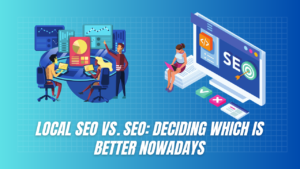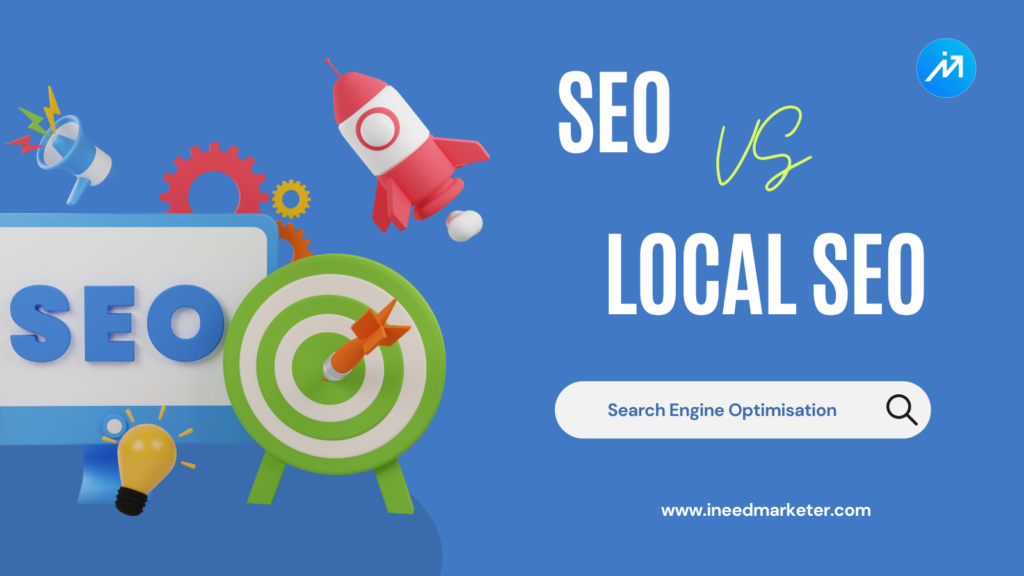In the ever-evolving landscape of digital marketing, search engine optimization (SEO) has become a buzzword that businesses cannot afford to ignore. However, there is a special branch of SEO known as local SEO. Although both share common goals of improving online visibility, there are differences between SEO and Local SEO.
In this blog post, we will explore the differences between SEO and local SEO, highlight their respective effectiveness, and emphasize the importance of including both in a comprehensive digital marketing strategy.
What is Local SEO and why is important?
Local SEO (Search Engine Optimization) refers to the practice of optimizing a business’s online presence to enhance its visibility in local search results. This involves optimizing website content, Google My Business (GMB) profiles, and other online platforms to ensure they align with local search queries. Local SEO is crucial for businesses that operate in specific geographic locations as it helps them attract nearby customers. The importance lies in increased online visibility, improved chances of appearing in local map results, and ultimately driving more foot traffic and conversions for brick-and-mortar establishments. Learn more about Local SEO Just – Click here
What Is SEO and Why Is It Important?
SEO, or Search Engine Optimization, is the practice of enhancing a website’s visibility and ranking on search engine results pages (SERPs). It involves optimizing various elements of a website, such as content, structure, and meta tags, to make it more attractive to search engines. The primary goal of SEO is to increase organic (non-paid) traffic to a website.
SEO is crucial for several reasons:
- Visibility and Traffic
- Credibility and Trust
- User Experience
- Cost-Effectiveness
- Competitive Advantage
To learn more about SEO Just – Click here
SEO vs. Local SEO: What’s the Difference?
- SEO: SEO (Search Engine Optimization) focuses on optimizing a website’s online presence and visibility on a global scale, aiming to improve its ranking in search engine results for broader and non-geographically specific queries.
- Local SEO: Local SEO, on the other hand, is a subset of SEO that targets specific geographic locations. It involves optimizing a website to enhance its visibility in local search results, making it more relevant for users in a particular region or locality.
SEO (Search Engine Optimization)
- Scope: SEO is a broader term that encompasses various techniques and strategies to improve a website’s visibility on a global or national scale.
- Target Audience: It targets a broader audience, often without specific geographical limitations.
- Keywords: SEO involves optimizing for general keywords and phrases related to the overall theme of the website or business.
Goals of SEO
- Improve organic search rankings on major search engines like Google, Bing, and Yahoo.
- Increase website traffic from a global or national audience.
- Enhance the overall online presence and authority of the website.
Local SEO (Local Search Engine Optimization)
- Scope: Local SEO is a specialized subset of SEO that focuses on optimizing a website for local search results.
- Target Audience: It targets a specific geographic location or a set of locations, making it more relevant for businesses serving a local community.
- Keywords: Local SEO involves optimizing for location-based keywords and phrases (e.g., “near me,” city names).
Goals of Local SEO
- Improve local search rankings, especially in Google’s Local Pack and Maps results.
- Attract local customers to physical stores or service areas.
- Optimize online business listings, such as Google My Business, for local searches.
- Enhance visibility for location-based searches on mobile devices.
Key Differences Between SEO and Local SEO
- Geographic Focus: SEO is more global or national, while Local SEO is specifically focused on a particular geographic area.
- Keywords: SEO targets general keywords, while Local SEO emphasizes location-specific keywords.
- Google My Business: Local SEO often involves optimizing and managing a business’s Google My Business profile for local searches.
- Citations and Local Directories: Local SEO may involve building citations and getting listed on local directories to establish a strong local presence.
Overlap
While SEO and Local SEO have distinct focuses, there is some overlap. Local businesses can benefit from both strategies, but the emphasis on local elements is more pronounced in Local SEO. For a comprehensive online presence, businesses often implement a combination of general SEO and Local SEO strategies.
Local SEO vs. SEO: Deciding Which is Better nowadays

- Local SEO: This strategy is focused on optimizing your online presence to attract local customers. It involves tactics like Google My Business optimization, local keyword targeting, and location-based content. Local SEO is crucial for businesses with a physical location or those targeting a specific geographic area.
- SEO: Traditional SEO aims to improve a website’s visibility on search engines globally. It involves optimizing for general keywords, building backlinks, and creating high-quality content. SEO is suitable for businesses with a broad target audience, including those that operate on a national or international scale.
- Choosing between them: The choice between local SEO and SEO depends on your business model and objectives. If you primarily serve a local community or have a physical store, prioritize local SEO. For businesses with a broader reach and online presence, traditional SEO is essential. Many businesses benefit from a combination of both strategies to maximize their online visibility and reach the right audience.
How much to charge for local SEO and SEO?
Determining the exact pricing for local SEO and SEO services can vary based on factors such as location, competition, and specific client needs. However, a common range for monthly fees is:
- Local SEO: $500 to $2,500 per month
- SEO (for broader reach): $1,000 to $5,000 per month
These figures are general estimates, and actual prices may differ based on the scope of work, industry competitiveness, and the level of expertise offered by the SEO service provider.
Regular SEO Strategy Impact My Local SEO or Local SEO Strategy Impact My SEO?
Local SEO can impact your overall SEO strategy, and vice versa. While regular SEO focuses on broader online visibility, local SEO specifically targets geographical relevance and aims to optimize for local searches. A well-integrated approach considers both aspects, ensuring a comprehensive strategy that enhances overall search engine performance.
How does a search engine work?
- Crawling: Search engines use automated programs called crawlers or spiders to browse the web and discover new or updated content.
- Indexing: Once the crawler collects information from web pages, the search engine creates an index, a database that organizes and stores the data in a structured format for faster retrieval.
- Ranking: When a user enters a query, the search engine employs algorithms to analyze the indexed data and rank relevant pages based on factors like content quality, relevance, and user experience.
- Query Processing: The user’s search query is processed, and the search engine retrieves relevant results from its index.
- Results Display: The search engine presents the user with a list of ranked results, usually displayed on a search engine results page (SERP), based on the algorithmic assessment of relevance and importance.
- Continuous Update: Search engines constantly update their indexes to include new content and ensure that search results remain accurate and up-to-date.
When you will focus on local SEO?
Focusing on local SEO is crucial when your business targets a specific geographic area. It helps improve your online visibility within the local community, increases relevant traffic, and enhances your chances of attracting nearby customers.
The Benefits of Local SEO
- Increased Visibility: Local SEO helps businesses appear in local search results, enhancing visibility to potential customers in the vicinity.
- Targeted Traffic: It attracts relevant local traffic, increasing the likelihood of converting online searches into offline visits and sales.
- Mobile Optimization: With the rise of mobile searches, local SEO ensures businesses are easily found by users on the go.
- Competitive Edge: Optimizing for local search provides a competitive advantage, especially for small businesses competing with larger enterprises.
- Community Connection: Local SEO fosters a sense of community, making it easier for businesses to connect with and engage local customers.
- Google My Business Benefits: Local SEO strategies often involve optimizing Google My Business listings, and providing valuable information to potential customers.
- Reviews and Trust: Positive local reviews and ratings, a byproduct of local SEO efforts, build trust and credibility among local consumers.
- Cost-Effectiveness: Local SEO is often more cost-effective than broader marketing strategies, providing better ROI for businesses targeting local markets.
When you will focus on SEO?
Regular SEO (Search Engine Optimization) is essential for maintaining and improving a website’s visibility and performance in search engine results. It is necessary when:
- New Content
- Algorithm Changes
- Competitive Landscape
- User Experience
- Technical Maintenance
In summary, regular SEO is an ongoing process necessary for adapting to changes in the online landscape, maintaining competitiveness, and delivering a positive user experience, all of which contribute to sustained and improved search engine rankings.
The Benefits of SEO
- Increased Visibility: SEO improves a website’s ranking in search engine results, increasing its visibility to potential visitors.
- Traffic Quality: Targeted SEO strategies attract relevant users, leading to higher-quality traffic and potential customers.
- Credibility and Trust: Higher search engine rankings often correlate with increased trust and credibility among users.
- Cost-Effectiveness: Compared to paid advertising, organic traffic from SEO is a cost-effective way to drive visitors to a website.
- Improved User Experience: SEO involves optimizing website elements, leading to a better overall user experience.
- Local Business Growth: Local SEO helps businesses reach local customers, boosting foot traffic and online visibility in specific geographic areas.
- Competitive Advantage: Effective SEO allows businesses to outperform competitors in search engine rankings.
- Long-Term Results: Unlike some short-term marketing tactics, the benefits of SEO can be sustained over the long term.
- Mobile Optimization: SEO efforts often involve optimizing for mobile devices, crucial in an era where mobile internet usage is prevalent.
- Analytics and Insights: SEO tools provide valuable data and insights into user behavior, helping businesses make informed decisions.
Measure success: How to find your local traffic

Website Analytics
Utilize tools like Google Analytics to track website traffic. Monitor the number of visitors, page views, and bounce rates. Analyze the source of the traffic to understand how many are local visitors.
Local SEO Performance
Optimize your website for local search by including location-specific keywords. Monitor your rankings on search engine results pages, and track the visibility of your business in local searches.
Google My Business Insights
Leverage insights from your Google My Business (GMB) listing. Monitor the number of views, clicks, and direction requests. GMB provides valuable data on how users interact with your business locally.
Social Media Engagement
Evaluate engagement metrics on social media platforms. Look for likes, shares, comments, and follower growth from your local audience. Platforms like Facebook and Instagram offer insights into the demographics and location of your audience.
Conversion Tracking
Set up conversion tracking on your website to measure specific actions, such as form submissions or online purchases. Analyze how many of these conversions originate from local visitors.
Foot Traffic and In-Store Analytics
If applicable, use in-store analytics or foot traffic tracking tools to measure physical visits to your business location. This is particularly relevant for brick-and-mortar stores.
Customer Surveys and Feedback
Collect feedback from customers, both online and offline. Use surveys to understand where your customers are coming from and what attracted them to your business.
Local Advertising Performance
If running local ads, evaluate the performance metrics provided by the advertising platform. Track clicks, impressions, and conversions generated through local advertising efforts.
Competitor Benchmarking
Compare your local traffic metrics with competitors in your industry. Assess your market share and identify areas for improvement based on the performance of similar businesses.
Repeat Business and Loyalty
Measure customer retention and loyalty within your local customer base. Repeat business and positive reviews from local customers are indicators of sustained success.
Regularly analyze these metrics to adapt your strategies, refine your approach, and ensure ongoing success in attracting and retaining local traffic.
Google Analytics
Google Analytics is a powerful tool for tracking website performance, providing valuable insights for both SEO and local SEO strategies. By analyzing data such as organic traffic, keyword performance, and user behavior, businesses can optimize their online presence to improve search engine rankings and effectively target local audiences. Integrating Google Analytics with SEO efforts enables informed decision-making. In the context of local SEO, tracking location-based metrics in Google Analytics helps businesses shape their approach to attracting and retaining local customers. Ultimately driving success in the competitive digital landscape.
Google Search Console

Google Search Console is a powerful tool for managing and optimizing your website’s presence on Google Search. It aids in SEO (Search Engine Optimization) by providing insights into how Google crawls and indexes your site, identifying search performance metrics, and offering suggestions for improving site visibility.
When it comes to Local SEO, Google Search Console helps businesses enhance their online presence in specific geographic areas. It allows you to submit a sitemap, monitor local search performance, and address issues affecting local search rankings. By utilizing this tool, businesses can refine their strategies to attract local customers and improve overall search engine visibility.
Google Business Profiles
Google Business Profiles play a crucial role in enhancing SEO and Local SEO for businesses. By optimizing your profile, you improve your online visibility and increase the likelihood of attracting local customers. Key strategies include:
- Complete Profile Information
- Keyword Optimization
- Quality Photos
- Customer Reviews
- Local Citations
- Google Posts
- Google My Business (GMB) Categories
- Location-Specific Content
- Local Backlinks
- Regular Updates
Learn more from our previous blog about Google My Business Just – Click Here
Local Keywords
Local Keywords are specific terms or phrases that target a particular geographic area, optimizing content for local search. These keywords play a crucial role in both SEO (Search Engine Optimization) and Local SEO strategies. In regular SEO, keywords focus on broad relevance, while Local SEO emphasizes location-specific terms to connect businesses with nearby customers. Integrating local keywords into website content, meta tags, and business listings enhances visibility in local search results, boosting the online presence of businesses within a specific region. Effective use of local keywords helps businesses attract relevant traffic, improve search engine rankings, and increase visibility among local audiences.
How do Local SEO and organic SEO affect each other?

- Synergy: Local SEO and organic SEO efforts complement each other, reinforcing overall search visibility.
- Keywords Alignment: Aligning local and organic keywords enhances relevance for both local and broader searches.
- Citations Impact: Consistent NAP (Name, Address, Phone) information in local SEO positively influences organic rankings.
- Link Building: Local links contribute to organic authority, fostering a stronger backlink profile.
- User Experience: Local SEO optimizations, like accurate business information, improve user experience and can reduce bounce rates, benefiting organic rankings.
- Mobile Optimization: Local SEO often involves mobile optimization, contributing to improved organic mobile search performance.
- Reviews and Ratings: Positive local reviews can enhance organic click-through rates and user trust.
- Google My Business: An optimized GMB profile positively impacts both local map pack rankings and overall organic results.
In conclusion
While SEO and Local SEO share common ground in their objective to improve online visibility, they cater to different audiences and purposes. Businesses aiming for a holistic digital marketing strategy should incorporate both SEO and Local SEO techniques to maximize their reach and impact. Striking the right balance between these two strategies can result in a robust online presence that attracts both a global audience and local customers.
If you need any inquiry just message us or comment here. Thanks

